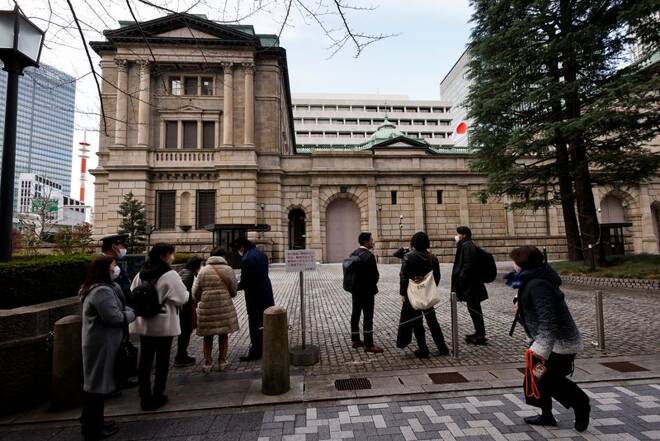Advertisement
Advertisement
IMF urges BOJ to allow longer yields to move more flexibly
By:
By Leika Kihara TOKYO (Reuters) - The Bank of Japan (BOJ) should consider allowing the longer end of the bond yield curve to move more flexibly even as it maintains ultra-loose monetary policy, Ranil Salgado, the International Monetary Fund's Japan mission chief, said on Friday.
By Leika Kihara
TOKYO (Reuters) -The Bank of Japan should consider allowing longer-term interest rates to move more flexibly even as it maintains ultra-loose monetary policy, a senior International Monetary Fund official said on Friday.
The central bank can mitigate the strain on financial institutions by allowing the longer end of the curve to move more under its bond yield control policy, Ranil Salgado, the IMF’s Japan mission chief, said on Friday.
By suppressing the shorter end of the curve such as three to five-year borrowing costs, the BOJ can keep offering sufficient support to the economy even if it allows longer-term rates to rise more, he added.
“Policy should remain accommodative for now,” Salgado told an online briefing, on Japan’s monetary policy. “Our advice has been (for the BOJ) to consider (allowing) greater flexibility at the longer-end yields,” he added.
The IMF sees two-sided risks to Japan’s inflation outlook with “upward surprises” coming from bigger-than-expected wage hikes from companies’ spring wage negotiations with unions, Salgado said.
Downside risks mainly stem from global factors with recent financial shocks, such as the collapse of U.S. banks, raising the prospect of a global recession and putting downward pressure on inflation including in Japan, he added.
Salgado made the remarks at the briefing announcing the conclusion of the IMF’s annual policy consultation with Japan.
Under yield curve control (YCC), the BOJ guides short-term rates at -0.1% and the 10-year bond yield around 0%. Its huge bond buying to defend an implicit 0.5% cap set for the 10-year yield target has been criticised for distorting bond pricing and making the market dysfunctional by drying up liquidity.
Markets are rife with speculation the BOJ could tweak or end YCC to mitigate such side-effects when incoming Governor Kazuo Ueda takes the helm from Haruhiko Kuroda, whose term ends in April. The BOJ’s first policy meeting chaired by Ueda will be held on April 27-28.
In a statement on the policy consultation, the IMF said many directors of its 24-member executive board encouraged the BOJ to “consider options for introducing more flexibility” under YCC to address the side-effects of prolonged easing.
“Many directors, however, stressed the need to avoid a premature exit from monetary easing and agreed with the authorities that maintaining the current monetary policy framework is appropriate,” the statement said.
The chance of an abrupt change of the current monetary policy framework was among downside risks to Japan’s growth outlook, the statement added.
(Reporting by Leika Kihara; Editing by Jacqueline Wong and Stephen Coates)
About the Author
Reuterscontributor
Reuters, the news and media division of Thomson Reuters, is the world’s largest international multimedia news provider reaching more than one billion people every day. Reuters provides trusted business, financial, national, and international news to professionals via Thomson Reuters desktops, the world's media organizations, and directly to consumers at Reuters.com and via Reuters TV. Learn more about Thomson Reuters products:
Advertisement
